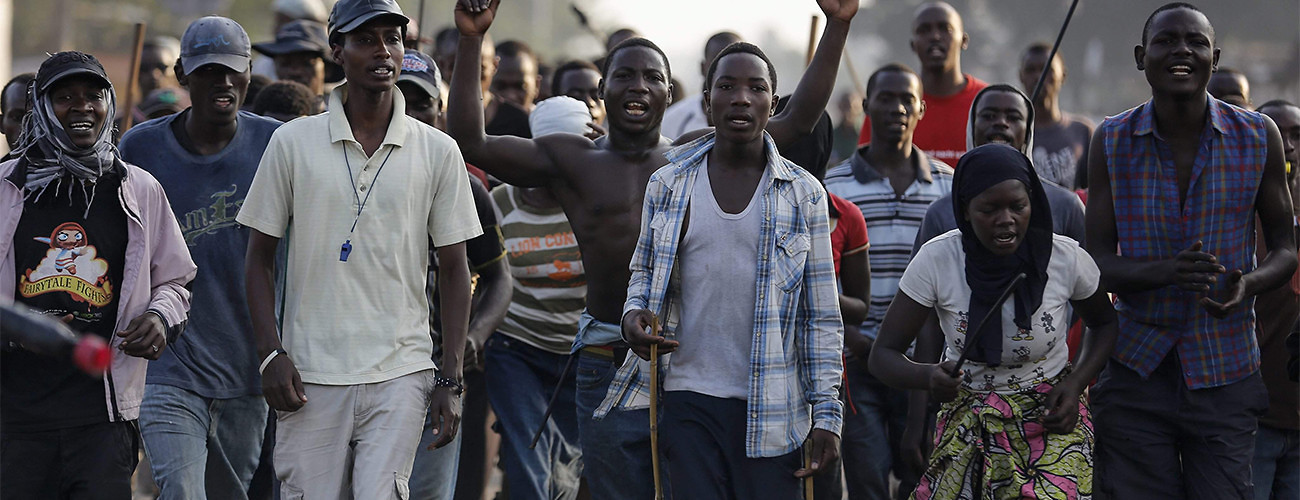Protesters demonstrate in Bujumbura against Burundi President Pierre Nkurunziza seeking a contentious third term in office.
On April 25, Burundi’s ruling party, the National Council for the Defense of Democracy–Forces for the Defense of Democracy (CNDD-FDD), confirmed what had long been suspected: incumbent President Pierre Nkurunziza will run for a third term in June’s presidential elections. Members of the country’s fragmented political opposition argue that, should he be successful, it would violate the constitution. Protests have already led to at least six deaths, and there is a threat of continuing violence as voting draws nearer.
The weeks leading up to Nkurunziza’s announcement were already tense and marked by sporadic fighting between opposition parties and the CNDD-FDD’s youth wing, the Imbonerakure. Security measures were subsequently increased and political protests banned, illustrating the strained political atmosphere in the country.
The United Nations High Commissioner on Refugees announced on April 17 that Rwanda and the Democratic Republic of the Congo recorded 8,000 Burundians entering their countries as a result of political tensions and persecution at home. The continuing debate over Nkurunziza’s plans will likely widen existing political and cultural rifts and prompt even more Burundians to flee to these neighboring countries.
The protests and refugee situation paint a troubling picture of Burundi’s political landscape. Once held up as an example of successful consociationalism—a form of power-sharing that in Burundi’s case promotes fair ethnic political representation—the country now threatens to succumb to instability. While the recent fighting has not been exclusively on ethnic lines, it poses a significant threat to Burundi’s ruling agreements, which could allow disputes of this nature to reemerge with more force.
The Arusha Peace and Reconciliation Agreement of 2000 put in place a delicate ethnic power sharing agreement in which two vice presidents must belong to different ethnic groups and different political parties, the Hutu proportion of the cabinet is capped at 60%, the Senate must include two members of each ethnic group per province, accommodations are made for representation of the Twa people, and the National Assembly must have 60% Hutu and 40% Tutsi representation. Opponents of CNDD-FDD and Nkurunziza, who is a Hutu, argue that they are attempting to “consolidate Hutu power” through their recent actions, and are threatening to revive ethnic tensions.
Many of Burundi’s present tensions also derive from intra-Hutu disagreements in the ruling party: members of the military are increasingly concerned by the prominence and autonomy of the Imbonerakure, while some political elites are being sidelined by the present administration’s authoritarian and centralized nature. The March escape from prison of Hussein Radjabu, a former power-player in the CNDD-FDD, who was sentenced for “plotting an armed rebellion,” suggests the party is struggling to maintain political control. Radjabu’s escape is still largely unexplained, possibly occurring with compliance of his guards, and might indicate that sidelined elements in the CNDD-FDD are organizing against Nkurunziza.
The June elections will present a further test for what is still a nascent democracy. Burundi only emerged from a brutal civil war—fought largely along ethnic lines between the majority Hutu and minority Tutsi—in 2005. The current debate over Nkurunziza’s eligibility to run for a third term in office is in turn a complicated one. The 2005 constitution articulates that the president is to be elected through “universal direct suffrage” for a two-term maximum. Nkurunziza’s supporters argue that, since he was indirectly elected by the National Assembly following the civil war, his first term does not count towards that limit. The CNDD-FDD also made a previous controversial bid to for a constitutional amendment that would have removed any prohibition on a third term, but the effort was narrowly overturned by parliament.
The CNDD-FDD gained its current concentrated power in Burundi’s 2010 elections, which were boycotted by the opposition, citing voter fraud. Democracy advocates have noted the deterioration in press freedoms and undemocratic actions since that time. The UN Office of the High Commissioner for Human Rights has reported that human rights activists in the country are “treated as political opponents by the state and subject to physical threats, anonymous phone calls, arbitrary arrests, assaults, and judicial harassment.” Meanwhile, a number of high-profile journalists have been detained, harassed, and arrested. Zeid Ra’ad, the UN High Commissioner for Human Rights, has also pointed to a pattern of “extreme examples of hate speech” at government rallies in recent months.
Nkurunziza’s campaign could inflame ethnic tensions and reduce the democratic character of the country, most significantly by undermining the Arusha agreements, leading to their slow deterioration or outright collapse. In the meantime, the political tension is exacting a heavy human toll. According to reports from those fleeing the country, members of the Imbonerakure have stolen opponents’ property and threatened to burn down their homes. Human Rights Watch reported in February that the group was responsible for the extrajudicial executions of 47 armed militants. Even those who flee are not safe. According to one refugee “the Imbonerakure have built camps in the bush at the border, so that you can be monitored all the time.” Those caught fleeing are beaten or killed, according to refugees in Rwanda.
The next few weeks will test the strength of Burundi’s democracy and the resilience of the power sharing agreement that ended the country’s brutal 12-year civil war. In a public statement addressing the low-intensity violence of the past few months, the UN’s Ra’ad reminded the country’s leaders that “Burundi cannot afford another outbreak of violence. It cannot afford it economically, politically, socially, or culturally. It cannot afford it domestically or internationally.” While a descent into wider political or ethnic violence is not predetermined, the thousands of Burundians that have fled the country have already decided that they cannot afford to bear witness to the electoral results, and could offer a sign of more to come.
Hilary Matfess is a researcher with the Nigeria Social Violence Project at the Johns Hopkins University School of Advanced International Studies.





